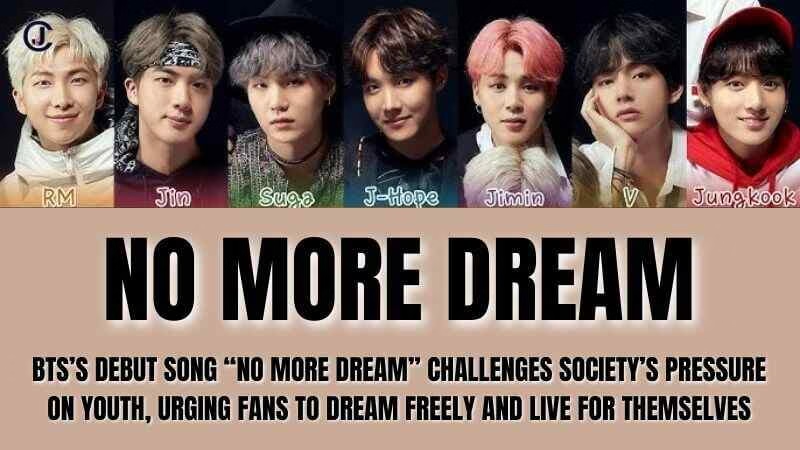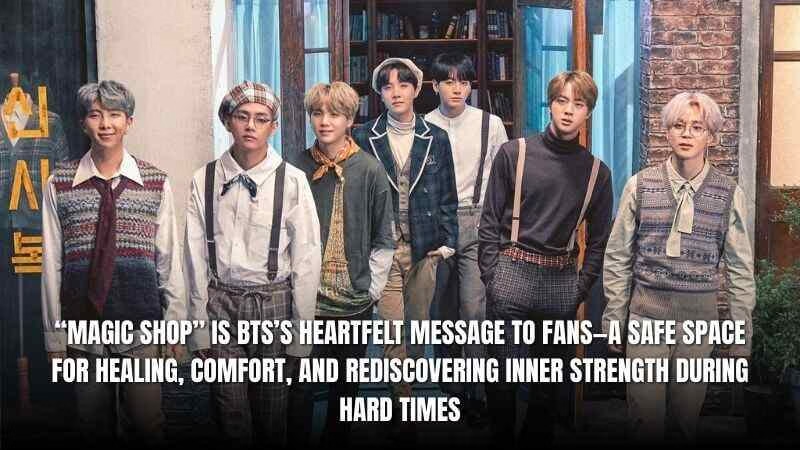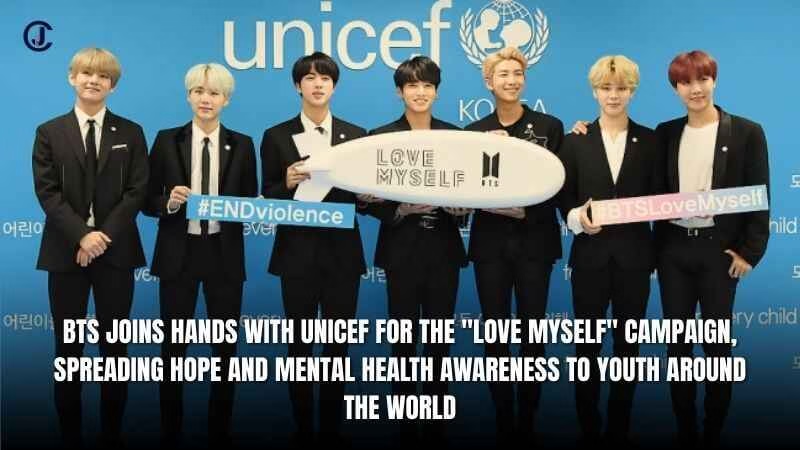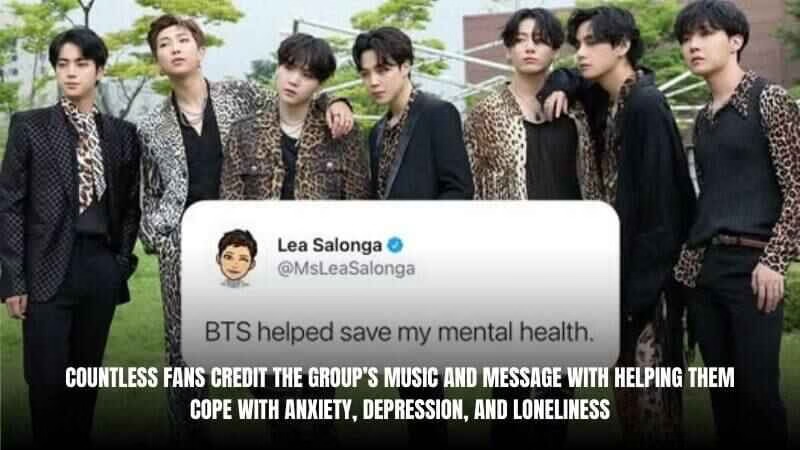Table of Contents
BTS isn’t just a K-pop sensation – they have become the global voice of mental well-being. Usually speaking to societal pressures affecting youth, issues of identity, or personal experiences, the songs urged fans to never hold back about expressing their feelings. Since tracks like “No More Dream” questioned society’s expectations of young people in the very beginning, the existence and activities of BTS around the theme challenged the notion that all must embrace a single path.
They combine catchy tunes with candid lyrics that ask the listener to face life and chase their own dreams. One lyric calls out the listener to think about whether their true self is living the life they dreamed of or is just an impression of someone else: “What’s the image of you that you dreamed of? Right now who do you see in the mirror?” As time went by, BTS albums, in their own way, solidified this theme even more by putting a voice to affected fans who felt missed or pressured and gave a notion of okay to not always be okay.
The band’s impact is widespread and uplifting. With tens of millions of fans (known as ARMY) across the globe, BTS’s message of empathy and self-care “reaches every corner of the globe” through music and social media. Listeners often find comfort and strength in their songs. Studies and reports highlight how BTS’s honesty about mental health is changing conversations worldwide. For example, in interviews Suga (Agust D) has spoken out about the need to treat mental health like physical health – saying people shouldn’t be ashamed to admit they’re not always okay.
Jin and others provided their own personal anxieties in the songs “Awake” and “Abyss,” breaking down the idol stereotype and giving the fans permission to be vulnerable. As one media analysis states, BTS talks about depression and burnout in their songs and interviews with the goal of destigmatizing mental illness. This approach made many young listeners realize that they are seen and understood and that BTS is speaking directly to them.
Also Read: Mental Health Matters: 5 Powerful Reasons Masculinity Hurts Men
Tackling Pressure and Identity in Song

Many BTS hits directly address the stress young people face. In their debut single “No More Dream,” the group challenges the idea of following prescribed dreams (like going to top universities). The lyrics describe a frustrated youth saying, “I want to see the beginning not the end,” and they urge fans to dare to imagine a different future, not one solely defined by others.
A commentator notes that RM asks listeners to compare their current self to the person they once dreamed of becoming, then “says you should go your own way” even if it’s a short detour. This sets the tone for BTS’s career-long theme: questioning unrealistic expectations and valuing self-direction.
As BTS’s sound evolved, they continued exploring identity and doubt. On Love Yourself: Answer (2018), tracks like “Idol” flip the script on criticism. The song’s defiant hook “You can’t stop me lovin’ myself” proclaims that others’ opinions won’t shake their self-worth. In fact, one fan review explains that “Idol” tells listeners not to let outside voices affect how much you appreciate yourself.
Meanwhile, members’ solo tracks reinforce the same message. For instance, Jin’s “Epiphany” explicitly declares “I’m the one I should love in this world,” transforming self-love into a personal anthem. Together, these Love Yourself songs form an arc: acknowledging pain and confusion in earlier albums (like “Fake Love”) and moving toward acceptance in later ones.
The Love Yourself albums sent a clear message: self-care is essential, not selfish. This theme has resonated globally. UNICEF reported that BTS’s “Love Myself” campaign (tied to these albums) has spread “positive messages of self-love and self-care” to nearly every country. One UNICEF press release even highlights that BTS and their label partnered with UNICEF in 2017 to help young people end violence and boost self-esteem worldwide.
Fans have shared countless stories of how this series made them feel understood. For example, one student wrote that when the Love Yourself albums came out, she “finally felt like somebody understood me,” and said the message “brought reassurance and comfort to thousands of people”. These personal reactions show how the albums’ focus on acceptance and healing struck a chord.
Songs About Healing: Magic Shop, Blue & Grey, The Last and More
BTS also built songs around emotional healing, often using metaphors and color to discuss tough feelings. In “Magic Shop” (2018), the group literally invites fans into an inner refuge. Inspired by the memoir Into the Magic Shop, the song describes a special place in one’s heart where one can trade fears for strength (like selling sadness and buying comfort). Psychiatrists have noted that this is akin to a therapeutic “warm up” technique – “a place waiting to comfort you when your self-esteem is low”.
Research on fan listening habits found that many people play “Magic Shop” to “improve their mood, as a stress reliever, to reduce depression,” essentially using the song as a self-healing tool. BTS acknowledges this purpose. The lyrics urge fans who feel broken to “make a door in your heart… you’ll find a place which will always await you”, emphasizing that healing begins from within. In short, “Magic Shop” serves as a musical comfort zone: listening feels like talking to a friend who truly understands and cares.

- Magic Shop: A fan sanctuary. This upbeat pop-rap track encourages listeners to open an internal door and enter a place of comfort when they feel hopeless. It was co-written by Jimin and Jungkook as a gift to ARMY, and its lyrics explicitly say it’s okay to be yourself and that you have the power to heal your own pain.
- Blue & Grey: V’s confessional ballad about depression. In this slow, tender song from BE (2020), V layers blue and grey imagery to depict sadness and exhaustion. He wrote it during a particularly dark period, saying “it felt like I was in a tunnel and I couldn’t see the exit”. The grief is so real that finishing the song gave him relief. He later said hearing “Blue & Grey” complete gave him “a sense of accomplishment” and helped him finally “let go of Blue & Grey”. Psychologists note that by “naming” his feelings with color, V used a classic coping strategy: labeling emotions to gain control. BTS fans worldwide have felt seen by this raw honesty, finding comfort in knowing even stars can feel lost and lonely.
- The Last (Agust D): Suga’s alter-ego dives deepest into darkness. On his 2016 mixtape, Suga raps as Agust D and takes off the idol mask completely. He admits suffering from “depression, anxiety, OCD, and social phobia”, directly naming what hurts him. He even raps “Behind a successful idol rapper stands my weak self”, revealing the pain hidden under his confident facade. In interviews, Suga has argued that admitting to mental struggles shouldn’t be seen as weakness – just as people aren’t called weak for being sick physically. “The Last” shows him confronting his inner demons through music, and listeners around the world have praised the raw honesty for validating their own battles.
Other tracks carry similar themes. Jin’s “Epiphany” serves as a self-love anthem, repeating “I’m the one I should love in this world”. RM’s songs like “Answer: Love Myself” and “Forever Rain” explore the journey of accepting flaws. Even songs like “Spring Day” (about longing and loss) and “Not Today” (about resistance) touch on staying strong through pain.
In each case, BTS’s lyrics acknowledge that pain, confusion, and self-doubt are real, but they pair those messages with hope. Fans often quote BTS lines to each other as mantras. As one ARMY noted, seeing BTS “express their displeasure with society… and tackle issues such as mental health” was exactly why she fell in love with the group.
Love Myself Campaign with UNICEF: Global Advocacy
BTS sought to spread good vibes via their music, joining the “Love Myself” campaign with UNICEF. At the tail end of 2017, the group stood with UNICEF in the #ENDviolence movement. This movement finds young people from all over standing against violence, bullying, and low self-esteem. The group adopted the green ribbon (a symbol for mental health), provided a little bit of exposure for it, and created content around self-acceptance.

The campaign quickly gained traction: UNICEF reports it generated almost 5 million tweets and over 50 million social media engagements with messages of self-love from 2017 to 2020. In other words, millions of people were talking about BTS’s message of empowerment online. BTS and their label also supported Love Myself financially. They donated album profits and merch proceeds to UNICEF. By early 2021, they had raised over US$3.6 million for violence prevention programs.
They even addressed the United Nations twice: in 2018 RM gave a powerful speech about self-acceptance, saying “I have come to love myself for who I was, who I am, and who I hope to become”, and the band spoke on bullying and mental health again in later UN events. These efforts weren’t just symbolic. As BTS said, while helping others they also “strived to ‘Love Myself’ [themselves], and as a team and individuals grew as well”.
By 2024, the results were clear. UNICEF announced that over 8.9 billion won (about US$6.6 million) had been donated worldwide through the Love Myself campaign. The campaign “reached almost every country in the world” and has given “immense comfort and courage” to children and youth globally. BTS’s global influence – 39 million followers on Twitter alone – helped spread this message far beyond Korea.
When UNICEF executives describe BTS’s impact, they praise the group for sparking conversations on mental well-being in an “unmatched and invaluable” way. In short, BTS used their platform not just to entertain but to advocate for mental health on a worldwide scale.
BTS, ARMY, and Global Connection
One reason BTS’s approach is so powerful is the strength of their fan community. Known as ARMY, these fans span cultures and languages, united by BTS’s honesty. It’s not unusual for ARMY to share personal messages and BTS lyrics with each other when someone is down. Media outlets note that fans “find strength from BTS” and turn the band’s positivity into their own support network.
For example, fan-run initiatives like “ARMY Help Center” on Twitter collaborate with mental health hotlines so that any fan in crisis can get immediate counseling. Others have formed groups like One in an ARMY to fundraise for mental health education programs, extending BTS’s ideals into real-world action. These connections cross borders. A health magazine points out that the Love Myself campaign “reached almost every country in the world” with BTS’s message. Fans from Asia to the Americas feel the same core issues: pressure to succeed, loneliness, and anxiety. BTS often include basic English phrases and multicultural symbols in their videos, making the songs accessible to global listeners.
The result is a shared language of healing. As one international fan wrote: “When BTS came out with this Love Yourself series, I finally felt like somebody understood me.”. That feeling of being “understood” highlights how BTS’s words resonate on a human level, beyond music or language. Global media have taken notice too. For instance, psychological experts have remarked that BTS normalizes mental health struggles by showing that even world-famous artists need help sometimes. Fans have created countless projects – from charity drives to fan art – inspired by BTS’s themes.
On World Mental Health Day, news outlets ran BTS quotes, and over social media, ARMY shared BTS lyrics like “You are the one I should love” as daily affirmations. In essence, BTS’s influence has catalyzed a worldwide dialogue on mental well-being, led by their multicultural fanbase.
Fan Stories: Real Impact Beyond the Music
The true measure of BTS’s impact can be seen in personal stories. Many fans describe moments when a BTS song or lyric felt like a lifeline. One devoted fan shared how BTS’s sincerity pulled her in: she watched all their vlogs and performances and “couldn’t help but feel genuinely attached… because of their sincerity, hope, and passion”. As she explored BTS’s discography, she realized “they expressed their displeasure with society… and tackled issues such as mental health and education,” which made her eagerly await new releases. In this way, BTS gave her language to understand her own feelings and frustrations.
Other fans recount specific songs guiding them through tough times. One fan wrote that she “got to a point where nothing was uplifting me… then “Singularity” resonated with me.” The lines “Have I lost myself or have I gained you?” from V’s solo made her realize that hiding her true self only made her loneliness worse.

The fan says hearing V question himself helped her learn that “the right path begins with embracing your flaws and forgiving yourself”. In practical terms, after hearing BTS speak so openly, she started talking about her interests and worries with others, slowly gaining confidence. As she puts it: thanks to BTS’s “comforting words” and shared doubts, the introspection she began helped her finally accept and love herself.
These fan voices echo the campaign’s reach. The younger BTS members often mention receiving messages from fans who sought counseling because they felt understood by a BTS song. The band encourages this openness; for instance, Jimin once participated in a UNICEF forum about youth anxiety, and shared how music helped him cope with stress. Meanwhile, Jin has said publicly that seeking counseling helped him write “The Astronaut”, demonstrating that even idols need help – a message fans see as permission to seek help for themselves.
In concrete terms, BTS-inspired communities have raised real funds and support. The group “One in an ARMY” ran a fundraiser for youth mental health education, and ARMYs around the world organize support chats and resource shares on social media. These activities often directly cite BTS’s lyric or motto as inspiration. For example, some universities have even turned to BTS quotes like “I’m the one I should love” in student mental health campaigns. This shows the effect is very tangible: BTS’s message doesn’t just stay in the realm of pop culture, but motivates fans to build a kinder, more understanding world.
In summary, BTS uses every tool at their disposal – lyrics, interviews, campaigns – to promote emotional healing. With songs telling stories directly about pressure, loneliness, and self-worth, their music urges listeners to keep going and to love themselves. The “Love Yourself” series gave fans direction on how to get from pain to acceptance, and songs like “Magic Shop,” “Blue & Grey,” and “The Last” gave a name and image to feelings that many really struggled to express.
Complementing this, their Love Myself campaign and candid UN speeches have helped millions of young people feel seen and valued. Above all, the BTS-ARMY community keeps these messages alive: fans comfort each other, share stories, and even organize for mental health causes. As one UNICEF official observed, BTS’s message of self-love has offered “immense comfort and courage to children and youth around the globe.” The band’s global influence – felt in fans’ tears at concerts, posts on social media, or funds raised for charity – proves that music can truly be a catalyst for personal healing and social understanding, far beyond just the charts.
Key Takeaways: BTS’s discography consistently addresses the emotional hurdles of youth (school stress, identity doubt, anxiety), often urging listeners to find strength within. Their Love Yourself album trilogy and Love Myself UNICEF campaign emphasize self-acceptance and have mobilized millions online. Notable tracks like “Magic Shop,” “Blue & Grey,” and Agust D’s “The Last” confront mental health directly, with fans using these songs as coping tools. The global ARMY amplifies this impact, creating peer-support networks and sharing personal testimonials. Overall, BTS has turned their platform into a positive force for emotional resilience and communal empathy worldwide.


2 thoughts on “BTS and Mental Health: 7 Powerful Ways Their Music Addresses Personal Struggles”